#ringling bros circus
Explore tagged Tumblr posts
Text
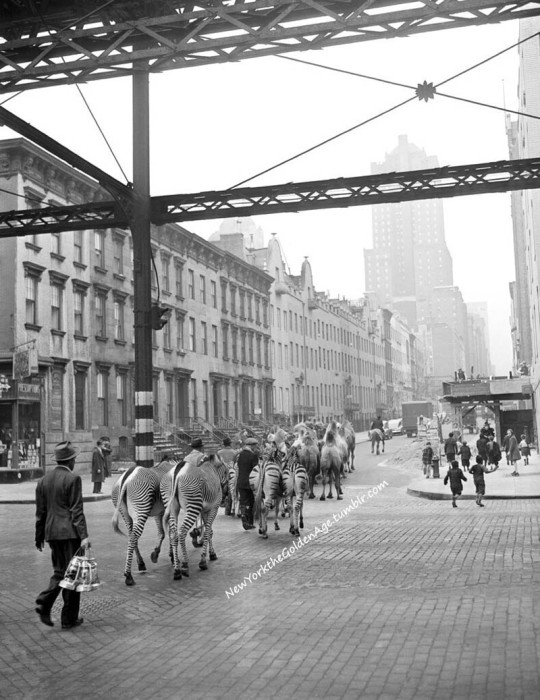
When zebras and camels roam the streets of New York, it can mean only one thing: the circus is in town. Just off the train from winter quarters in Florida, the animals make their way west on East 49th Street to Madison Square Garden, April 3, 1942 for the opening of the Ringling Bros. and Barnum & Bailey Circus.
Photo: John Lindsay for the AP
#vintage New York#1940s#John Lindsay#zebras#camels#Ringling Bros Circus#April 3#3 April#animals#wild animals#animals roaming streets#circus animals
131 notes
·
View notes
Photo
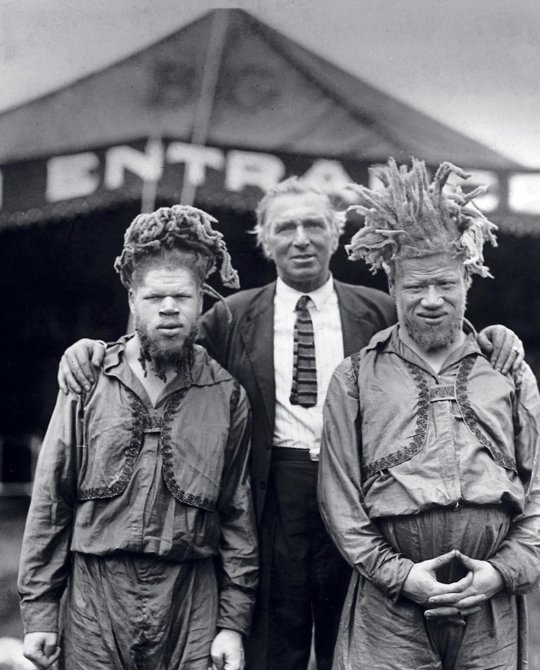
In the year 1899, two African-American brothers with albinism were forcibly taken and exploited as performers in a circus.
Renowned as "The Sheep-Headed Men," "The White Ecuadorian Cannibals Eko and Iko," and "The Ambassadors From Mars," George and Willie Muse gained worldwide fame as sideshow performers during the early 1900s. However, the true horrors of their story remained largely unknown to their predominantly white audiences.
Born with a rare form of albinism in the African-American community, the Muse brothers fell victim to a traveling "freak hunter" who targeted them when they were young boys and forcibly abducted them from their home in Virginia. Their distinctive appearance, characterized by African-American albinos with pale blue eyes and blond hair, coupled with their poor vision due to an eye condition often misunderstood as a mental impairment, made them easy targets for exploitation by a traveling circus.
Under the control of their captors, the brothers were compelled to grow out their hair and were sold to various traveling sideshows, including Ringling Bros. Circus. Despite being denied access to education and literacy, as well as being deprived of any financial compensation, George and Willie possessed remarkable musical talents. They could hear a song once and flawlessly reproduce it on any instrument they were handed, be it a guitar, banjo, harmonica, saxophone, or xylophone. Their handlers greatly underestimated their abilities.
Their years of enslavement finally came to an end in 1927 when Ringling Bros. Circus returned to Roanoke, and George recognized their mother among the crowd. Overwhelmed with emotion, George exclaimed, "There's our dear old mother. Look, Willie, she is not dead." This poignant reunion marked the turning point in their lives, bringing an end to their captivity and the beginning of a journey towards reclaiming their freedom and identity.
#african-american#1899 photo#1899#photography#The Sheep-Headed Men#ringling bros circus#african-american history
2 notes
·
View notes
Text

Ringling Bros and Barnum & Bailey Combined Circus - Prairie Bill And His Congress Of Rough Riders Of The World, 1933 poster
#1933#1930s#vintage#circus#ringling bros and barnum & bailey#painting#art#illustration#poster#circus poster
44 notes
·
View notes
Text
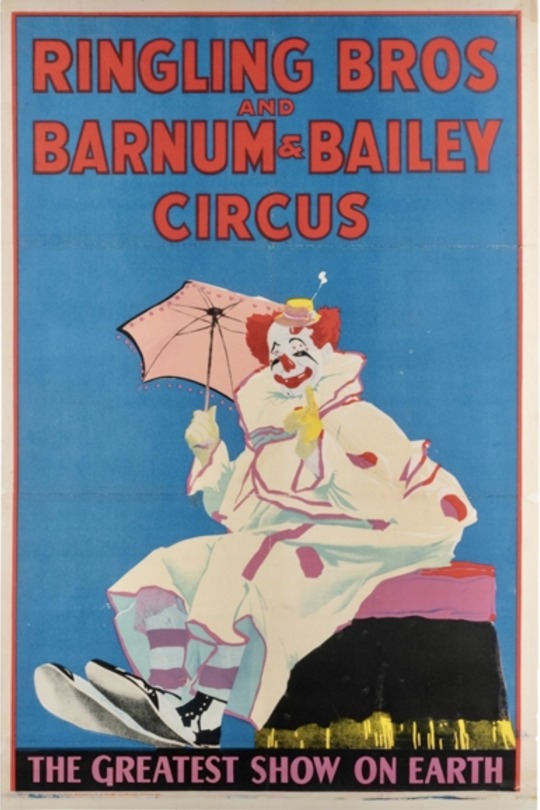
Circus Poster: Ringling Bros. and Barnum & Bailey Circus / The Greatest Show on Earth (1943). Poster depicting Felix Adler the clown
18 notes
·
View notes
Text
God made me susceptible to motion sickness because otherwise I'd be running away with the circus.
#trapeze artists are SO COOL#but my body can't even handle a park swing for very long#i found out the ringling bros barnum & baileys circus is coming to my city in a monthhhhh#after finishing book of circus it feels like a sign#phoenix rambles
4 notes
·
View notes
Photo
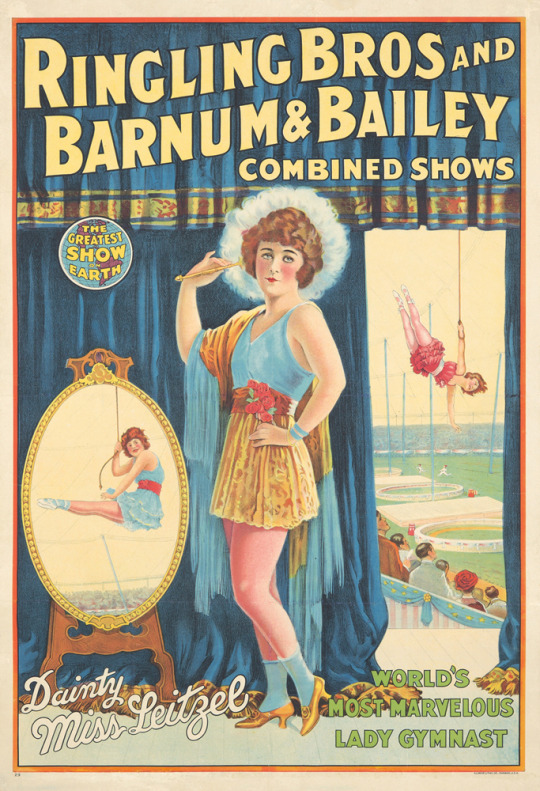
Affiche pour le cirque Ringling Bros and Barnum & Bailey avec en vedette Lillian Leitzel - 1929
#Et pendant ce temps-là#Cirque#Circus#Ringling Bros and Barnum & Bailey#Acrobate#Acrobat#Lillian Leitzel#Affiche#Poster#1929
8 notes
·
View notes
Text


Gunther Gebel-Williams Farewell Tour shirt (1988)
Source
#gunther gebel williams#80s#circus#ringling bros#barnum and bailey#greatest show on earth#gunther gebel williams farewell tour
2 notes
·
View notes
Text

CircusGalaxy float (1980-1) for #RinglingBrothers, Barnum & Bailey Circus pageant at Circus World Museum. Baraboo, WI. 51st century ad
1 note
·
View note
Text

1980s Clown Plush Lot Ringling Bros Dakin Circus Clowns
#png#transparent#kidcore#nostalgia#nostalgiacore#toycore#toywave#toys#plush#stuffed animals#clown#clowncore#cw clown#tw clown
189 notes
·
View notes
Text

This photograph shows JP Morgan and Lya Graf, a prominent circus performer in the early 20th century. She was known for her small stature and charismatic presence as a star attraction with the Ringling Bros. and Barnum & Bailey Circus.
Born in Germany in 1901 with dwarfism, Lya stood just over three feet tall. Her unique appearance and charm made her a sensation in the circus world, where she was often billed as the "German Lilliputian." Despite her success in the circus, Lya’s life took a tragic turn with the rise of the Nazi regime in her homeland.
As a Jewish woman, she faced increasing danger under the oppressive and anti-Semitic policies of the Nazis. Lya eventually fled to the United States to escape the growing persecution in Germany. However, her past caught up with her, and she made the fateful decision to return to Germany, possibly to visit her family.
Upon her return, Lya Graf was arrested by the Nazis and deported to Auschwitz, the infamous concentration camp where she was killed.
73 notes
·
View notes
Text
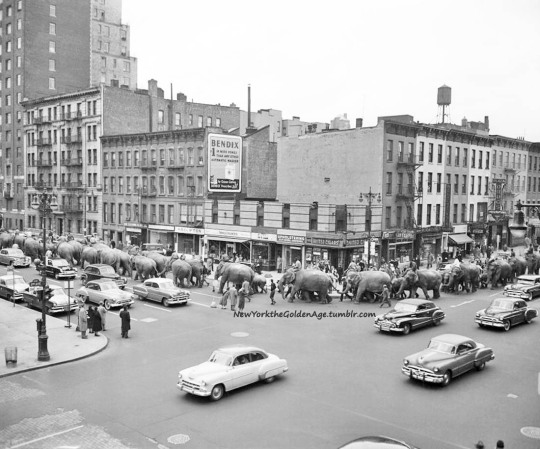
The long line of elephants swinging west on 57th Street from Second Avenue on March 27, 1955, could mean only one thing: the circus was in town. Despite freezing temperatures and winds with gusts over 50 miles an hour, hundreds of children lined the parade route from railroad yards at 135th Street and Lincoln Avenue in the South Bronx, down Second Avenue, across 57th Street and south to Madison Square Garden via Ninth Avenue. The Ringling Bros. and Barnum and Bailey circus opened with a benefit performance at the Garden on March 30.
Photo: Associated Press via Der Spiegel
#vintage New York#1950s#Ringling Bros. circus#circus#Ringling Bros. and Barnum & Bailey Circus#elephants#March 27#27 March#Mar. 27#elephant parade
78 notes
·
View notes
Photo

A poorly faked photo from Ringling Bros. and Barnum & Bailey Circus.
Source details and larger version.
Here's my collection of vintage circus imagery.
58 notes
·
View notes
Text
reading more abt circus history and learning that during the golden age of the circus, the circus owners would often put themselves on advertising posters for brand recognition. and apparently the Ringling bros would put all five of themselves on their posters but they all looked so similar that their only real defining features were their slightly different moustaches, and this was such a widely known/recognized thing at the time that people would sometimes straight up refer to their circus as "the five moustaches". and i am dying bc it has me thinking of them like a magical girl anime where the only distinguishing features between the girls are their hairstyles. like look at these motherfuckers:

(do not pay attention to the fact that this is a poster for a ringling bros edition of the crusades that's a post for another day)
470 notes
·
View notes
Text

Ringling Bros Barnum & Bailey Greatest Show on Earth Souvenir Circus Horse
#just suddenly remembered this existed#its supoosed to have a little pink feather on its head#theres also another on lifting one foot but i had this one :)#horse toy#horse figure#uploads
113 notes
·
View notes
Text
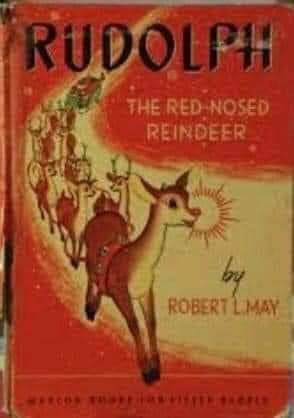
Wow, I had no idea about the origin story of Rudolph the Red-Nose Reindeer! If you aren't familiar with it either, read below:
As the holiday season of 1938 came to Chicago, Bob May wasn’t feeling much comfort or joy. A 34-year-old ad writer for Montgomery Ward, May was exhausted and nearly broke. His wife, Evelyn, was bedridden, on the losing end of a two-year battle with cancer. This left Bob to look after their four-year old-daughter, Barbara.
One night, Barbara asked her father, “Why isn’t my mommy like everybody else’s mommy?” As he struggled to answer his daughter’s question, Bob remembered the pain of his own childhood. A small, sickly boy, he was constantly picked on and called names. But he wanted to give his daughter hope, and show her that being different was nothing to be ashamed of. More than that, he wanted her to know that he loved her and would always take care of her. So he began to spin a tale about a reindeer with a bright red nose who found a special place on Santa’s team. Barbara loved the story so much that she made her father tell it every night before bedtime. As he did, it grew more elaborate. Because he couldn’t afford to buy his daughter a gift for Christmas, Bob decided to turn the story into a homemade picture book.
In early December, Bob’s wife died. Though he was heartbroken, he kept working on the book for his daughter. A few days before Christmas, he reluctantly attended a company party at Montgomery Ward. His co-workers encouraged him to share the story he’d written. After he read it, there was a standing ovation. Everyone wanted copies of their own. Montgomery Ward bought the rights to the book from their debt-ridden employee. Over the next six years, at Christmas, they gave away six million copies of Rudolph the Red Nosed Reindeer to shoppers. Every major publishing house in the country was making offers to obtain the book. In an incredible display of good will, the head of the department store returned all rights to Bob May. Four years later, Rudolph had made him into a millionaire.
Now remarried with a growing family, May felt blessed by his good fortune. But there was more to come. His brother-in-law, a successful songwriter named Johnny Marks, set the uplifting story to music. The song was pitched to artists from Bing Crosby on down. They all passed. Finally, Marks approached Gene Autry. The cowboy star had scored a holiday hit with “Here Comes Santa Claus” a few years before. Like the others, Autry wasn’t impressed with the song about the misfit reindeer. Marks begged him to give it a second listen. Autry played it for his wife, Ina. She was so touched by the line “They wouldn’t let poor Rudolph play in any reindeer games” that she insisted her husband record the tune.
Within a few years, it had become the second best-selling Christmas song ever, right behind “White Christmas.” Since then, Rudolph has come to life in TV specials, cartoons, movies, toys, games, coloring books, greeting cards and even a Ringling Bros. circus act. The little red-nosed reindeer dreamed up by Bob May and immortalized in song by Johnny Marks has come to symbolize Christmas as much as Santa Claus, evergreen trees and presents. As the last line of the song says, “He’ll go down in history.”
@awesome moments
307 notes
·
View notes
Text

Brass band, Ringling Bros. Circus, Photo by Kenneth Heilbron. 1930-50
35 notes
·
View notes